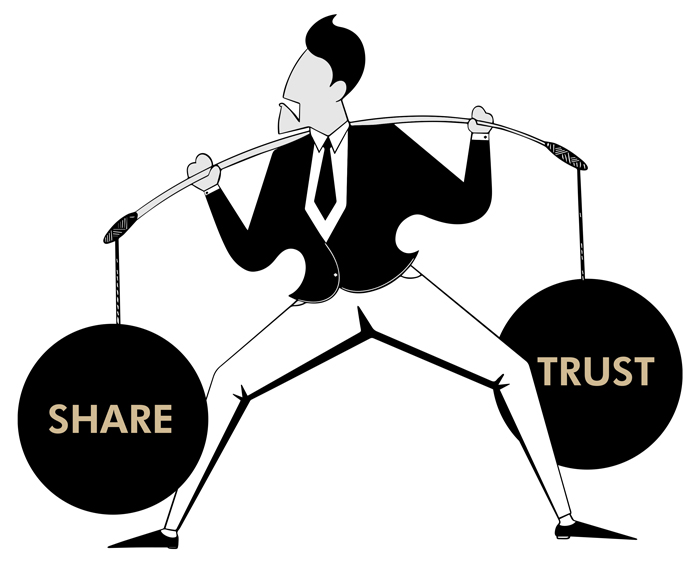A friend works for a large, multinational corporation, and was telling me how part of their annual employee survey includes open-ended questions that invite employees to provide feedback in their own words. Employees were told that the surveys are confidential, encouraging them to be as honest as possible—after all, sincere assessments from 10,000 employees can provide invaluable insights to the leadership teams.
 In order to get as much feedback as possible, the company sent reminders to employees who had not yet completed the survey, causing some to suspect that their responses weren’t anonymous after all. This suspicion understandably influenced their responses: Some of the staff said they were still completely honest, others admitted they “softened the truth,” and the rest said they just answered according to what they thought management wanted to hear to avoid problems. The bottom line? The company invested a lot of resources in a survey that ultimately contained faulty data.
In order to get as much feedback as possible, the company sent reminders to employees who had not yet completed the survey, causing some to suspect that their responses weren’t anonymous after all. This suspicion understandably influenced their responses: Some of the staff said they were still completely honest, others admitted they “softened the truth,” and the rest said they just answered according to what they thought management wanted to hear to avoid problems. The bottom line? The company invested a lot of resources in a survey that ultimately contained faulty data.
While employee engagement surveys (we’ll discuss those later) are the number-one way to get feedback from your team members, there are other ways to encourage employees to speak up more regularly. But it all comes down to creating and maintaining a genuine culture of open communication and regular feedback.
Open-Door Policy
If you want your employees to feel comfortable sharing their thoughts with you, you must make it clear that they can do so without fear of criticism, judgment, or repercussions. If you have an open-door policy, which I recommend to everyone, consider letting your team set the agenda for meetings from time to time. The more you create and foster an open and non-judgmental space for communication, the more likely your employees are to be honest with their feedback, which can improve the workplace for everyone. If the meeting is face to face, understand the impact that your reaction and tone could have on a conversation. Nothing closes an open door faster than being dismissive.
Suggestion Boxes
Some argue that suggestion boxes are an outdated way to get employee feedback, but if you have staff without access to a work computer or email, a suggestion box is a great way to solicit anonymous feedback. Put a schedule in place for checking the box so employees know you are paying attention. The suggestion box will die quickly if suggestions, feedback, and comments are disregarded or ignored entirely.
Collaboration
Another way to increase back-and-forth communication is by encouraging collaboration. When communication and information flow freely, knowledge is shared—and problems can be solved more quickly when everyone is putting their heads together. The sharing of ideas and suggestions can take place in a meeting, during a casual conversation, on an internal Facebook page, or via email.
Fresh Perspectives
Newer employees have different insights than your long-standing ones, but how do you get their feedback? Start on their first day! Ask about their orientation sessions. After a day of training, ask them about how the training went: what they learned as well as what they feel like they needed to learn but didn’t. It can be tempting to allow managers and new hires to fend for themselves during the onboarding process, but you’ll set the precedent for open lines of communication if you make yourself available during those crucial first weeks.
Employee Surveys
As many of you know, the employee survey is a tried and true way to request and receive employee feedback. These surveys ask pointed questions about the company, benefits, pay, purpose, effectiveness of management, and overall job satisfaction. The mistake my friend’s employer made was in trying to reach 100-percent participation by tracking who had and who hadn’t completed the survey: Whether or not it was truly anonymous, the perception was that it was not; therefore, responses and feedback were unhelpfully skewed. It’s better to receive honest feedback from engaged employees than get disingenuous answers from everyone.
Having a third party administer your employee satisfaction surveys is highly recommended. Your employees can rest assured that no one at the company is handling any portion of the survey and that potentially brutal honesty will not have consequences. An outside firm will communicate the pertinent information about the survey, conduct the survey, gather responses, and provide an actionable report to the employer.
Although we’ve only touched on a few of the different ways to gather employee feedback, there are many others to consider, such as cross-training and follow-up, requesting suggestions to address a specific issue or task, scheduling one-on-one meetings, simply asking for feedback, and owning and sharing your mistakes. Don’t forget that last one: Taking responsibility shows your employees that you know you are human and make mistakes, too. When you share your trials along with your successes, your employees feel that they can, too. [CD0120]
Christina Fiorenza is the HR Director for the LMG Group. she can be reached at By Stephanie Carnes and Christina Fiorenza
The Scottish industrialist Andrew Carnegie was an incredibly successful businessman and philanthropist who led the growth of the steel industry in the United States in the late 19th century. After the success of his steel empire, which established him as the richest man in America by 1902, he became a philanthropist and gave away more than 90 percent of his fortune. Ahead of his time, Carnegie was a strong believer in delegation and empowering his employees. Once, a friend told Carnegie that he got to work at 7:00 each morning. Carnegie replied, “You must be a lazy man if it takes you ten hours to do a day’s work. What I do is get good men and I never give them orders. My directions do not go beyond suggestions.”
 Good managers know how to accomplish each task that is required of them. Great managers know that they, themselves, shouldn’t be the ones completing every task for two reasons: 1) they trust their employees to handle the tasks, possibly better than themselves, and 2) they have confidence that their employees know how to manage their own schedules.
Good managers know how to accomplish each task that is required of them. Great managers know that they, themselves, shouldn’t be the ones completing every task for two reasons: 1) they trust their employees to handle the tasks, possibly better than themselves, and 2) they have confidence that their employees know how to manage their own schedules.
For those of us with control issues, learning to delegate takes time, practice, and skill. Managing our own worries about whether or not a task will be done well and if our employees are dependable can be a challenge. Losing that mindset of “it will never be done as well I could do it” can hold us back, and we’ll never learn to delegate if we don’t try. We have to trust that we’ve put the right team in place to tackle these responsibilities within the framework that we have created. And just think about all the time that will open up for more important things such as growth strategies and planning the next phases of the business.
"A star wants to see himself rise to the top. A leader wants to see those around him rise to the top.” -Simon Sinek, author and motivational speakerIn order to be an adept delegator—whether you’re the company owner or a manager—you must be able to communicate, listen, give feedback and guidance, train, and trust. You’re not necessarily telling them how to do it, but why it needs to be done. CLEARLY communicating why you are assigning the task, what the task is, and what the expectations are is paramount to ensuring that it gets completed correctly and on time. Effective oral and written communication skills are a necessity. And don’t forget that listening is a critical component of communication.
It’s important to remember that when we delegate an assignment to someone else, it doesn’t mean that we are no longer responsible, or that it’s off our plate and we can forget about it. When a task is delegated, managers should check in with their employees along the way to ensure that goals and timelines are going to be met and to offer advice and help whenever necessary. Once the task is complete, provide clear feedback on what was done well and discuss where it could have been improved and why. Providing this type of constructive criticism and direction will help employees perform better the next time they are faced with similar responsibilities.
An essential part of the delegation process is knowing which tasks can be handed off and which ones need to remain with you. Some responsibilities require a certain level of insight or expertise that can’t be passed on unless to another professional, such as legal or accounting issues. However, don’t be reticient to hand off tasks that may require a small bit of training from you or your manager: Effective training the first time around opens up your schedule the next time it needs to be done.
"The inability to delegate is one of the biggest problems I see with managers of all levels.” - Eli Broad, former CEO of SunAmerica and KB HomeThe final trait a leader needs to have in order to properly delegate is trust—having confidence that you and your team are working toward the same goals and objectives based on the company culture you have cultivated. Trust that all employees are performing their work with diligence and professionalism, becase at its core, trust is the opposite of micromanaging. It’s important to have confidence that your employees are doing the right things and will come back with expected results. Without trust, you spend time and energy following up and managing details you shouldn’t be.
Without delegation, it will be difficult for your company to grow and for you to evolve and mature as a leader. If you find yourself resisting the idea of handing off tasks to your trusted team, ask yourself what is holding you back. Do you feel that your employees have not been trained sufficiently, or do you tell yourself that the time it will take to explain the task to an employee is not worth it? Identifying the best responsibilities to delegate can be helpful. Start with those that are not a natural fit for you, and choose someone who has experience and skills in that area. The other type of task that is a good option for delegation are those that anyone can do. Take the time to delegate, and you will free your time up and empower your employees to take on more responsibility. [CD0220]
Stephanie Carnes is a certified MBTI consultant and the client solutions provider for The LMC Group. She can be reached at stephanie@lmc.group. Christina Fiorenza is the HR director for The LMC Group. She can be reached at christina@lmcpeople.com.
.

